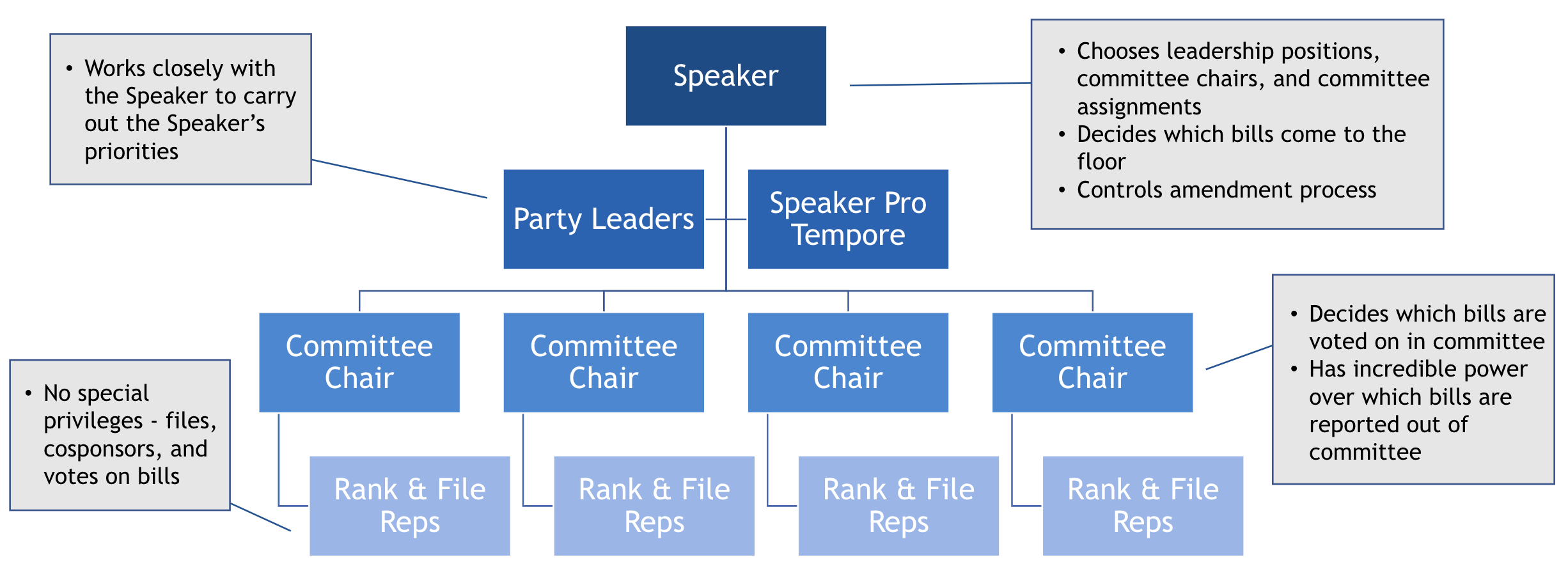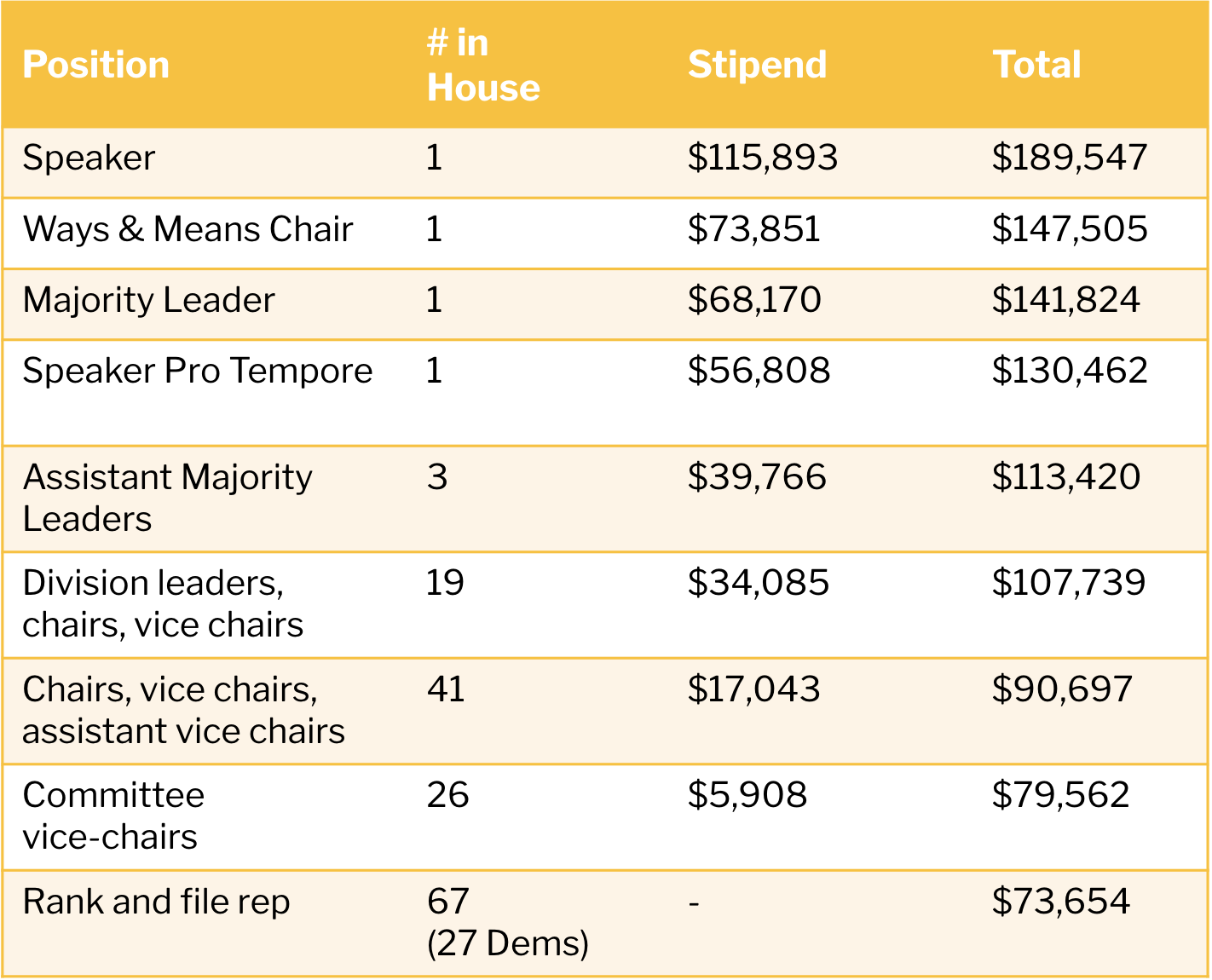
Six weeks into the 193rd legislative session, things are finally starting to move. Or more accurately, things can finally move: the senate president and house speaker just announced all legislators’ committee assignments, as well as chair and leadership positions. Now that committees are staffed and established, the lawmaking can begin.
You can see the official committee assignment sheets here: House, Senate.
If you, like me, had the [dis]pleasure of doing theater in high school, this scenario is one you know well; the speaker and senate president essentially just posted the cast list for the spring musical on the bulletin board outside the auditorium. Some legislators got the starring roles, and some were cast as “townsperson #3.”
Since we have no actual legislating to discuss in the Scoop just yet (fingers crossed for next week), let’s take this opportunity to dive into this hierarchy on Beacon Hill, and the political theater it creates.
And-a five, six, seven, eight: *jazz hands*
State House Scoop
Dynamics on Beacon Hill: ingroup v. outgroup
We at Act on Mass often talk about the anti-democratic concentration of power at the State House; how the power to determine the fate of legislation is ultimately in the hands of just a few people. But, who are these people? How many of them are there? Well, there are ten true “leadership” positions in the House, and eight in the Senate. These are the people who make decisions. Nothing passes without their explicit or implicit approval. Nothing.
Among the rest of the membership, there’s a spectrum of access to leadership. It goes something like this: chairs > vice chairs > assistant vice chairs > rank and file reps (i.e. reps with no special positions in the hierarchy). If you’re in the ingroup, you might get some element of your bill passed, after years and years, if you ask nicely (keyword here is “might”). If you’re in the outgroup (i.e. vote differently from leadership, advocate for things they don’t support, or don’t adequately ingratiate yourself) you don’t even get to know what bills are coming down the pipeline, never mind have any sway over it; you’re alienated from the lawmaking process and from your colleagues.

Rules debates as auditions for promotion and perks
Committee assignments are released shortly after the rules are debated. This has turned the rules into a brownnosing contest (or auditions, if we’re sticking with the theater metaphor). Lawmakers with chair or leadership ambitions use the rules floor debate to display their loyalty to the speaker or senate president in the hopes that they will be rewarded with more desirable committee assignments or a promotion of their chair position. This is, in part, why the rules have become so fraught; lawmakers get brownie points for speaking on the floor against Act on Mass-sponsored amendments. Indeed, certain lawmakers have even received additional staff right after changing their previously-held position on our amendments and speaking against them. Funny how that happens.
Money, money, money
Along with increased power and access, various positions assigned by the speaker or senate president come with significant stipends. It’s no exaggeration to say that the speaker and senate president determine the salary of each legislator. Here’s the pay breakdown in the House specifically:

Because there are so many committees with multiple chair positions, 93 of 120 Democrats in the House received a stipend at the pleasure of the speaker last session. Perhaps it’s no wonder why they’re so hesitant to piss him off: in 2021, 92% of representatives voted with the speaker every time a vote was recorded.
How this concentration of power manifests
While we’re swimming in examples of undemocratic operations in our state government, one salient illustration comes to mind: an incident from 2019 we at Act on Mass lovingly refer to as “Switch ‘em, Mikey!” You can watch it unfold in the video below, or read on for spoilers.
For the uninitiated (i.e. those who don’t spend their days watching the State House livestream), here’s a quick lo-down of what happens in the clip. The House is in the process of roll calling an amendment (I know, shocking they actually can take votes on the record). The speaker voted “nay” and the camera pans over to the vote board, which lights up green/”aye” or red/”nay” next to each rep’s name. The board lights up red, matching the speaker’s vote, when suddenly there’s a kerfuffle by the rostrum: “It’s a yes! Yes, yes. Switch ‘em! Mikey!” A few moments pass, and the camera pans back to the vote board, which is suddenly entirely lit up green. The speaker had accidentally voted the wrong way at first, and switched his vote. The amendment ended up passing… unanimously.
Take Action
Tell the conference committee on Joint Rules to maintain the Senate’s language for public committee votes!
While we didn’t get a provision for making committee votes publicly available in the House proposal for the joint rules earlier this month, there’s still a way to make it happen. The Senate’s proposal does include public committee votes, and now the two chambers must come to an agreement. Email your elected officials using this form to let them know that we want them to maintain the Senate’s version of rule 1D to the joint rules.
EMAIL YOUR REP ABOUT THE JOINT RULES >>
--
Ask your legislators to cosponsor Medicare for All in MA!
Our good friends at Mass-Care have refiled the Massachusetts Medicare for All bills (one in the House, one in the Senate) and are looking to break last year’s record of 82 Reps and Senators cosponsoring! Please complete this quick 3-minute email action to your State Rep and State Senator. If you can include a sentence or two about what Medicare for All would mean for you or your family, that would be extra powerful.
ASK YOUR REPS TO COSPONSOR MEDICARE FOR ALL >>
--
That's all for now! Have a wonderful holiday weekend, and I'll be back in your inbox next week.
[exit stage right],
Erin Leahy
Executive Director, Act on Mass
Want Saturday Scoops sent straight to your inbox? Subscribe to the Scoop here.
